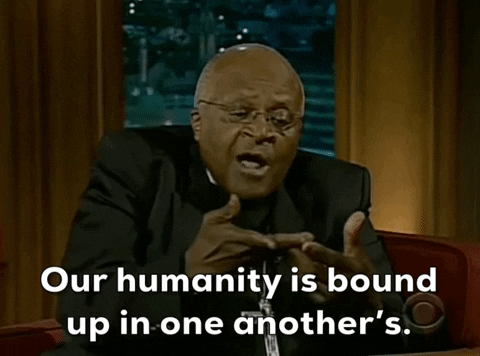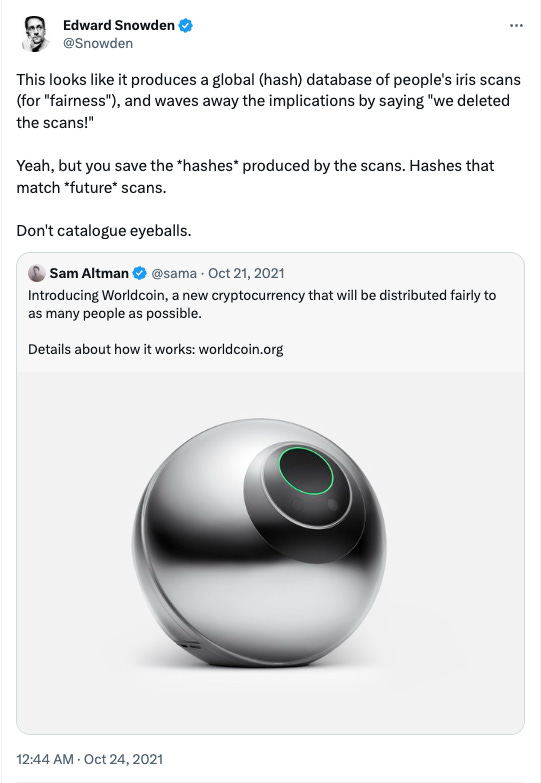Quest to catalog all humans 👽
Sam Altman’s Worldcoin has faced delays and is expected this quarter with almost 2M people. The project is among the most divisive in crypto and must now contend with a hostile regulatory environment
Hello, y'all. A free collectible. 20 seconds is all it takes 👇 own it now 🙌
This is The Token Dispatch, you can hit us on telegram 🤟 Don't forget to give your books a »» Muzify «« spin?
We're diving into the world of Worldcoin for the day, where retinas are scanned, tokens are distributed, and controversies abound?
Sam Altman, the CEO of OpenAI and co-founder of Worldcoin, is on a mission to shake things up in the crypto sphere and leave no human unregistered.
Read - Crypto's Worldcoin
Created by the mastermind Sam Altman, the founder of OpenAI, Worldcoin is a groundbreaking project.
Its mission? To scan eyes and grant almost 2 million people, mainly in the Global South, a share of its unique tokens.
Scaling Up for the Human Catalog
In a presentation from last year, Worldcoin boldly stated its mission to "sign up all humans" after launch. Quite the audacious goal, right? The project has received significant funding, valued at a whopping $3 billion during its latest raise. With prominent backers like Blockchain Capital and visionary boosters, Worldcoin is determined to strike a balance between financial freedom, big tech surveillance, decentralisation, and maximising profits.
Tools for Humanity
Worldcoin is a well-oiled machine with various moving parts. At its core, you have Tools for Humanity (TfH), founded by Alex Blania, Max Novendstern, and Sam Altman back in 2020.
TfH serves as the lead developer of the Worldcoin project, having raised over $240 million from venture backers, including a16z, Tiger Global, Khosla Ventures, and Coinbase Ventures. However, some deep-pocketed investors found the project's mission to create a global identity register too hairy and reputation-risky.
Foundation, DAO, and more
Worldcoin also embraces the decentralised spirit with its non-profit foundation, the Worldcoin Foundation, based in the Cayman Islands. This foundation's mission is to support the protocol and grow the Worldcoin community until it becomes self-sufficient. Future plans include setting up a DAO and developer grant programs to keep the momentum going.
The Enigmatic Orb and Operator Program
Worldcoin's uniqueness lies in its novel distribution approach. Instead of relying solely on mining, the project utilises biometric technology to physically scan people's irises.
A sci-fi-esque orb that scans people's retinas!
These orbs, weighing 2.7 kilograms each, have been in development for three years. Worldcoin has been running an operator program, compensating businesses with stablecoins for getting people scanned. Operator teams even get their hands on snazzy Worldcoin-branded clothes to spread the word.
This bold concept ensures equitable and fair distribution of the currency, free from the pitfalls of traditional mining methods.
Also the World ID and World App
But, the concerns
While Worldcoin had grand projections for sign-ups, they didn't anticipate the rise of a black market for verified credentials. Reports surfaced of people purchasing iris scans from other regions for as low as $30, raising privacy concerns.
Worldcoin has taken steps to address the issue and tighten security, but it's a reminder of the challenges they face.
When the Worldcoin project was unveiled in 2021, it stirred up a hornet's nest of controversy among privacy advocates. Whistleblower Edward Snowden issued a clear warning, "Don't catalogue eyeballs."
Yet, Worldcoin has been tirelessly defending its stance, mainly with technical explanations. They claim that their approach is "privacy-preserving" and point to a blog post supporting this claim.
According to Worldcoin's website, signing up for a World ID doesn't require sharing personal information like names, phone numbers, emails, or home addresses. Instead, the orb scans create unique iris codes, and the scans are immediately deleted unless users opt to share their data.
Airdrop and Tokenomics
The awaited launch of Worldcoin's token is a pivotal moment for the project. However, it has faced delays, with the airdrop initially scheduled for the first quarter and then the second quarter of this year. The airdrop will reward registered users who have undergone retina scans with Worldcoin tokens.
The project's deck suggests that users will be able to claim more tokens each week, with the amount decreasing over time. The tokenomics of the project reveal a total supply of 10 billion WLD tokens, with 80% reserved for users, operators, and the ecosystem, while 20% is set aside for the Worldcoin team and backers. Team members' and investors' tokens will unlock gradually over a three-year period.
Beyond Identity
Worldcoin envisions various use cases for its network beyond just establishing identity. One of the more interesting possibilities is being the foundation for a universal basic income system. But that's just the tip of the iceberg. The network could be used for voting in DAOs, financial services like under-collateralised lending, social networks, incentive programs, marketplaces, and more.
The project has strong ties to OpenAI, with a shared co-founder in Sam Altman. They argue that as AI continues to grow, the need for a verified human register becomes more crucial. However, not everyone agrees with this perspective, and the debate remains lively.
The Countdown to Launch
Worldcoin has not disclosed the exact launch date, but signs suggest that it's drawing near. They've rolled out World ID sign-ups in Germany and integrated their "sign in with Worldcoin" tool into Okta's Auth0 authorisation platform. The deployment of thousands of Gnosis Safes on Optimism by Worldcoin further indicates the project's progress.
TTD Week That Was 📆
The week of crypto finding its meaning in the larger scheme of things.
Saturday: Crypto VCs ride caution🫸
Friday: All that Ripple 🌈
Thursday: Rethinking NFT 🤒 🤔
Wednesday: ETH v BTC 👑
TTD Week in Funding 💰
Superblock $8 million. The developer of Over Protocol that aims to reduce storage needs with a new layer 1 blockchain based on the “Ethanos” protocol.
Cosmic Wire $30 million. Offers metaverse creation tools and a list of general blockchain infrastructure solutions.
Echooo Wallet $15 million. Account Abstraction (AA) wallet, based on Ethereum security and Layer 2 low cost.
Futureverse $54 million. Formed out of 11 different firms, aims to combine AI and blockchain to build infrastructure for users' experience of the metaverse.
Manta $25 million. Privacy-preserving protocol running on the Polkadot blockchain, ensuring transparency while maintaining user privacy.
If you like us, if you don't like us .. either ways do tell us✌️
If you dig what we do, show us lovee on Twitter, Instagram & Threads🤞
So long. OKAY? ✋











